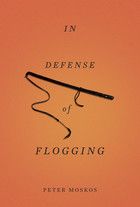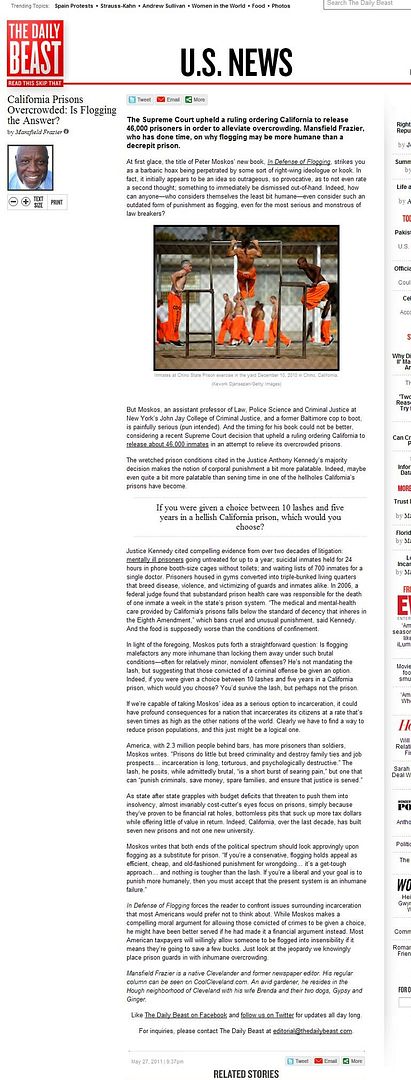|
Corpun file 23308
Bloomberg.com, New York, 25 May 2011
Flogging Could Answer America's Prison Problem (Seriously): Books Review
By Craig Seligman

The cover jacket of "In Defense of Flogging" by Peter Moskos.
Source: Perseus via Bloomberg |
"In Defense of Flogging" isn't a joke, a satire or a
thought experiment. Peter Moskos, a former Baltimore cop who's
now a professor at John Jay College of Criminal Justice,
seriously wants to reintroduce corporal punishment in the United
States.
Don't laugh: He makes a convincing case. From the
straightforward question he begins with -- "Given the choice
between five years in prison and 10 brutal lashes, which would
you choose?" -- he had my attention.
Moskos isn't a sadist or a fetishist. In fact, he finds
flogging distasteful. (He describes the physical effects in
graphic detail: "skin is literally ripped from the
body," etc.)
But he's far more outraged by the American penal system, which
incarcerates the largest total number (2.3 million) and the
largest per capita proportion (750 per 100,000) of prisoners of
any country in the world. When the U.S. has criticized China on
human-rights issues, Beijing has had the satisfaction of pointing
to these figures in response.
I doubt that even those of Moskos's readers most aghast at his
ideas will try to argue that American prisons are anything other
than dysfunctional. Moskos shows how the current system gradually
replaced corporal punishment with the goal of rehabilitating
wrongdoers.
Schools for Crime
But since it has long been evident that penitentiaries are
little better than schools for crime, he compares the true
believers in the "curative promises" of
rehabilitationists with diehard communists.

Peter Moskos, author of "In Defense of Flogging." Photographer:
Zorra O'Neill/Perseus via Bloomberg |
However promising their ideas once seemed, "for modern
reformers to maintain a utopian vision of incarceration that
flies in the face of two centuries of real-world failure is
inexcusable."
Flogging as punishment would be less disruptive to society
than incarceration, since "from behind bars a prisoner can't
be a father, hold a job, maintain a relationship or take care of
elderly grandparents." It would also cost taxpayers far, far
less.
Which is why what Moskos calls the Prison-Industrial Complex
-- the "political confluence of various interest groups that
benefit from the business of incarceration" -- would
furiously oppose it. Prisons have become such a massive industry
in the U.S. that downsizing them could mean thousands of jobs
lost. But is that really a reason to keep building them?
Beat Me
Moskos offers two important qualifiers to his proposal. First,
he's advocating corporal punishment "as an alternative to
incarceration, not an addition to it." (Unfortunately, it's
all too easy to imagine what might happen to this nuance in our
punishment-happy culture.)
Second, he considers it essential that such punishment
"only be done with the consent of the flogged. The status
quo of incarceration is always an option."

Click to enlarge |
"In Defense of Flogging" is one of the very few
public- policy books I've encountered that goes past wringing its
hands over a societal problem to offer a viable solution, by
which I mean one with a prayer of being put into place because it
has appeal across the political spectrum.
Conservatives could embrace corporal punishment as a real and
serious punishment for crime (in a way they couldn't embrace,
say, financial penalties or community service). Liberals could
accept it as an option that gives wrongdoers a much better shot
at a future than a prison sentence does.
Impulse Buy
And at just over 150 pages of clear, smart and highly readable
prose, Moskos's sharp little volume has a potential audience far
beyond the experts who dutifully slog through most tomes like
this. It's the kind of item that could be stacked next to a
bookstore's cash register. Think about it for a Fathers' Day
gift.
So does my enthusiasm mean I'm ready to endorse flogging? Not
quite. Penology is so far beyond my field of expertise that I
want to see the enraged counterarguments first. I know one thing,
though. Given the choice between 10 lashes and five years, I'd
take the whip. Let the debate begin.
"In Defense of Flogging" is published by Basic (183
pages, $20).
(Craig Seligman is a critic for Muse, the arts and leisure
section of Bloomberg News. The opinions expressed are his own.)
©2011 BLOOMBERG L.P. ALL RIGHTS RESERVED.
Corpun file 23324
The Daily Beast, 27 May 2011
California Prisons Overcrowded: Is Flogging the Answer?
The Supreme Court upheld a ruling ordering California to
release 46,000 prisoners in order to alleviate overcrowding.
Mansfield Frazier, who has done time, on why flogging may be more
humane than a decrepit prison.
By Mansfield Frazier

Inmates at Chino State Prison exercise in the yard December 10,
2010 in Chino, California. (Kevork Djansezian/Getty Images) |
At first glace, the title of Peter Moskos' new book, In
Defense of Flogging, strikes you as a barbaric hoax being
perpetrated by some sort of right-wing ideologue or kook. In
fact, it initially appears to be an idea so outrageous, so
provocative, as to not even rate a second thought; something to
immediately be dismissed out-of-hand. Indeed, how can anyone --
who considers themselves the least bit humane -- even consider
such an outdated form of punishment as flogging, even for the
most serious and monstrous of law breakers?
But Moskos, an assistant professor of Law, Police Science and
Criminal Justice at New York's John Jay College of Criminal
Justice, and a former Baltimore cop to boot, is painfully serious
(pun intended). And the timing for his book could not be better,
considering a recent Supreme Court decision that upheld a ruling
ordering California to release about 46,000 inmates in an attempt
to relieve its overcrowded prisons.
The wretched prison conditions cited in the Justice Anthony
Kennedy's majority decision makes the notion of corporal
punishment a bit more palatable. Indeed, maybe even quite a bit
more palatable than serving time in one of the hellholes
California's prisons have become.
Justice Kennedy cited compelling evidence from over two
decades of litigation: mentally ill prisoners going untreated for
up to a year; suicidal inmates held for 24 hours in phone
booth-size cages without toilets; and waiting lists of 700
inmates for a single doctor. Prisoners housed in gyms converted
into triple-bunked living quarters that breed disease, violence,
and victimizing of guards and inmates alike. In 2006, a federal
judge found that substandard prison health care was responsible
for the death of one inmate a week in the state's prison system.
"The medical and mental-health care provided by California's
prisons falls below the standard of decency that inheres in the
Eighth Amendment," which bans cruel and unusual punishment,
said Kennedy. And the food is supposedly worse than the
conditions of confinement.
In light of the foregoing, Moskos puts forth a straightforward
question: Is flogging malefactors any more inhumane than locking
them away under such brutal conditions -- often for relatively
minor, nonviolent offenses? He's not mandating the lash, but
suggesting that those convicted of a criminal offense be given an
option. Indeed, if you were given a choice between 10 lashes and
five years in a California prison, which would you choose? You'd
survive the lash, but perhaps not the prison.

Click to enlarge |
If we're capable of taking Moskos' idea as a serious option to
incarceration, it could have profound consequences for a nation
that incarcerates its citizens at a rate that's seven times as
high as the other nations of the world. Clearly we have to find a
way to reduce prison populations, and this just might be a
logical one.
America, with 2.3 million people behind bars, has more
prisoners than soldiers, Moskos writes. "Prisons do little
but breed criminality and destroy family ties and job
prospects... incarceration is long, torturous, and
psychologically destructive." The lash, he posits, while
admittedly brutal, "is a short burst of searing pain,"
but one that can "punish criminals, save money, spare
families, and ensure that justice is served."
As state after state grapples with budget deficits that
threaten to push them into insolvency, almost invariably
cost-cutter's eyes focus on prisons, simply because they've
proven to be financial rat holes, bottomless pits that suck up
more tax dollars while offering little of value in return.
Indeed, California, over the last decade, has built seven new
prisons and not one new university.
Moskos writes that both ends of the political spectrum should
look approvingly upon flogging as a substitute for prison.
"If you're a conservative, flogging holds appeal as
efficient, cheap, and old-fashioned punishment for wrongdoing...
it's a get-tough approach... and nothing is tougher than the
lash. If you're a liberal and your goal is to punish more
humanely, then you must accept that the present system is an
inhumane failure."
In Defense of Flogging forces the reader to confront
issues surrounding incarceration that most Americans would prefer
not to think about. While Moskos makes a compelling moral
argument for allowing those convicted of crimes to be given a
choice, he might have been better served if he had made it a
financial argument instead. Most American taxpayers will
willingly allow someone to be flogged into insensibility if it
means they're going to save a few bucks. Just look at the
jeopardy we knowingly place prison guards in with inhumane
overcrowding.
Mansfield Frazier is a native Clevelander and former
newspaper editor. His regular column can be seen on
CoolCleveland.com. An avid gardener, he resides in the Hough
neighborhood of Cleveland with his wife Brenda and their two
dogs, Gypsy and Ginger.
| 
![]()